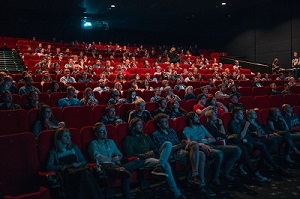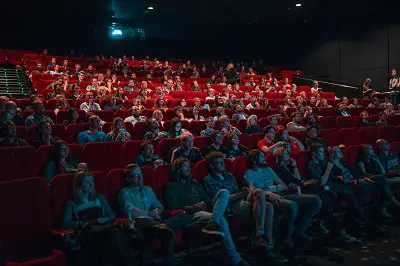Is it rude to be on your phone while watching a movie? Manners are used in a social context so it can be assumed that if someone is considering the question of rudeness during entertainment it’s because they’re around other people.

If you are watching a movie with friends, it is rude to use the phone, as you will give the impression that you do not care about the shared experience.
If someone is watching a movie at home and they’re alone, there wouldn’t be anyone else present to be offended by their phone use.
Going Out with Friends
Going out to movies with friends gives you an opportunity to spend time with people who you sometimes haven’t seen in a while. You might want to catch up by talking before and after the movie.
Watching the movie together provides you with a shared experience that you can reflect on directly after and for many years to come.
If you’re using a phone during the movie, you’re likely to miss important details, making it hard for you to participate in any conversation focused on what you missed.
It can be irritating when you realize that you can’t participate fully, so it benefits you when you put your phone down and concentrate on having a good time with your friends, being fully present in that social situation. [1]
If necessary, point out to your friends that they should send you an email instead of a phone call, which you can answer at a more convenient time.
While watching a movie together, friends may communicate non-verbally. Some might avoid verbal communication because they don’t want to distract others from the movie.
If your eyes are glued to your phone, you’ll miss out on nonverbal signals that your friends may try to send you. So, using your phone during a movie would be perceived as being rude.
For example, a friend might touch you at an important point in the movie. They might turn and wink at you or turn and smile at you. Some may lean toward you or even rest their head on your shoulder. If your body is positioned to maximize your use of your phone, you won’t be fully responsive to any of these gestures.
Out on a Date
The purpose of a date is a connection. Whether you’re meeting with a romantic interest for the first time or you’ve been married to someone for years and are having your regular date night, the quality of the time that you spend together is partially determined by how well you engage with each other.
Just as a conversation with another person would be a distraction, the phone can also be a distraction. If you’re supposed to be conversing with your romantic partner and instead scrolling on your phone, you’re not giving them your full attention. This is not only rude, but it’s also hurtful.
During quality time, you express your love and affection for your partner by giving them your undivided attention. [2] This means putting away your tablet and putting down your cell phone.
It also means not stopping to make notes on a notepad, constantly fidgeting, or doing anything else that shows that your thoughts are on anyone else but your partner.
Despite what some people may think, it’s impossible to really hear everything that a person is saying if you’re doing something else while you’re attempting to listen to them. Distracted listening causes unnecessary tension in romantic relationships.
Romantic partners want to know that you’re interested in having a conversation with them. If your body language says that you’re not fully engaged, you’re thinking about your plans for later on are worrying about something else, it will detract from the experience that they have at the movies with you. [3]
If you’re at a movie, you’ll already be somewhat distracted by what’s going on in front of you on the screen. Additional distractions will only decrease the amount of time that you can spend paying attention to your partner.
Watching Movies in an Educational Context
Movies offer a great way to help people learn. This is true at any age. Even very young children learn a lot from the movies that their parents allow them to watch.
This is why it’s important to be selective about the content that children are allowed to view. Many teachers use movies to bring geography, history, and other subjects to life.
As such, they might say that students can ask questions during the film. It may also be expected that students will do their research on new information that’s presented or questions that are raised during the viewing. The same applies when training is being conducted at a workplace and a movie is used.
The information that is shared might prompt immediate questions and in fact, it’s usually expected to do so. All team members who are participating in the viewing are expected to learn as much as they can from this type of media.
While children and adults can review questions from a movie after it has ended, it’s usually helpful to get answers immediately since these enhance their understanding of everything that follows after that point in the film. This is where a cell phone or tablet can be useful.
A child can quickly access notes on the movie by using their mobile device. Search engines can provide information related to details that are presented in the film. In such a context, it’s not rude to use a cell phone during a movie.
However, it is expected that the device that’s being used for research during the film will not be a distraction to others. So, the individual who’s checking facts or seeking additional information can ensure that the volume on their device is low and other steps are taken to avoid distracting other viewers.
In college buildings, the network speed and bandwidth can sometimes be a concern. If a college has limited internet resources and the lecturer is aware of this, they might tell students not to conduct research on their devices during the movie.
In that case, it would be inconsiderate and selfish to go against this policy since having several students using multiple devices during the movie would be likely to affect the streaming experience.
References:
[1]: https://psycnet.apa.org/record/2014-52302-001
[2]: https://www.verywellmind.com/quality-time-love-language-4783540
[3]: https://www.nytimes.com/guides/smarterliving/be-a-better-listener

Sophie Hammond is a journalist, psychologist, and freelance speechwriter for people in politics and business. She lives on the edge of the Rocky Mountains with her dog and a lifetime supply of books. When she’s not writing, she can be found wandering through nature or journaling at a coffee shop.

